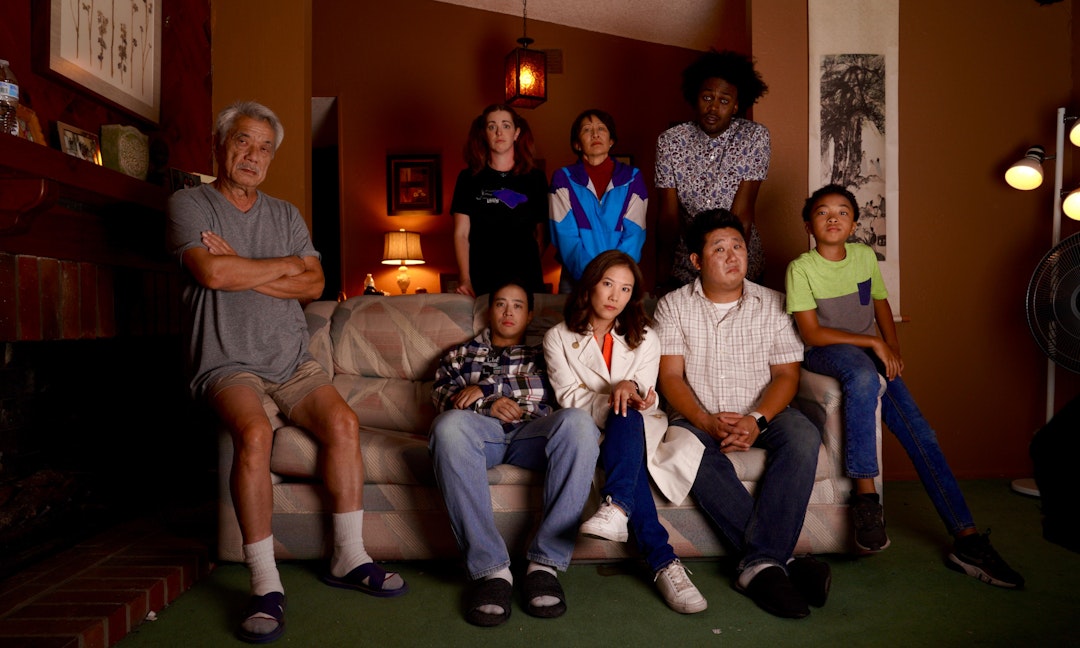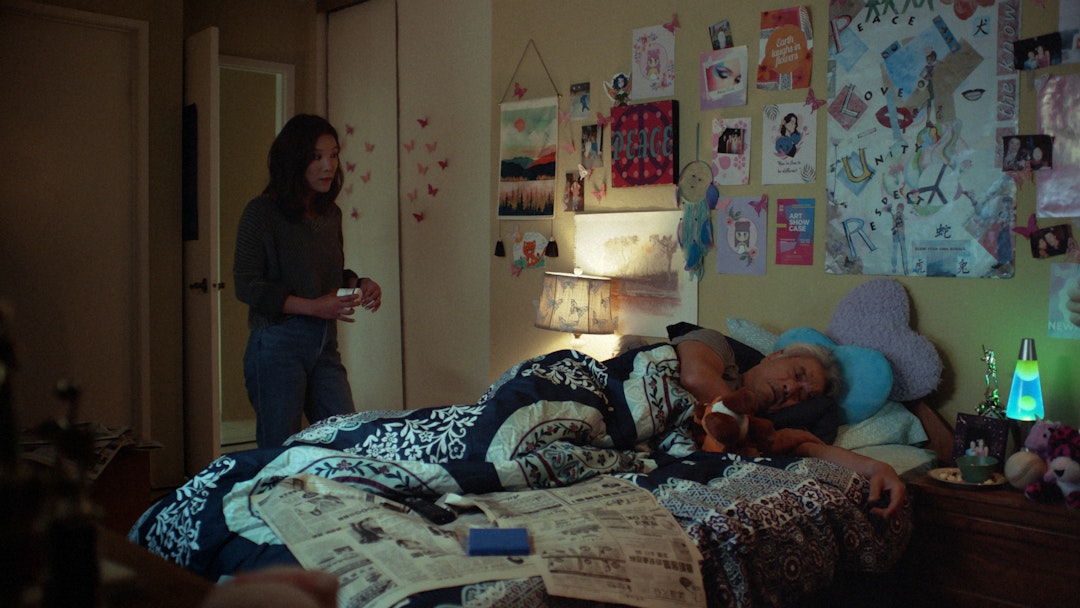
The story at the heart of writer-director Tom Huang’s Dealing with Dad (2022) is a cliché: The Americanized grown children of Asian immigrants come to terms with the poor emotional parenting of their father. The real twist isn’t in the premise of the Taiwanese father (Dana Lee) having depression, but rather, what if he actually doesn’t have a heart of gold?
Ally Maki plays middle sister Margaret, filling the archetypal role of high-strung type-A East Asian woman previously held by Constance Wu. Amidst the daily whirlwind of texts dealing with work, family, and her son’s (Caleb Mantuano) school — and watching her texting while walking reminds us how texts eat up more time than phone calls — she gets one mentioning her dad’s “condition.” How strange, as he was his usual verbally abusive self just five months ago at Thanksgiving, when he called the dressed-up Margaret a “Bangkok whore” (presented in flashback, as edited by Kurt Nishimura).
By calling her two siblings, she provides us a convenient introduction to the whole brood. Eldest Roy (Peter S. Kim) is an insurance clerk, and a wreck: His beloved wife is divorcing him (offscreen), and he self-medicates with food. He, like Margaret, knows nothing about the new Dad. Youngest Larry (Hayden Szeto), in his early thirties, is an unemployed geek who lives at home and occasionally sells toys and collectibles at the local comic book store. When asked, he says that Dad’s been “moping around” but has improved; when pressed, he proves evasive. A trip home to Milpitas, CA, looms.
The man himself gets hyped up before we meet him. Everyone has a nasty story about him, and even those who only know of him in passing remark on his inclination to yell about, and at, all and sundry. Most of these stories aren’t that shocking though, basically boiling down to corporal punishment, lack of positive reinforcement, rigidly perfectionist standards, and an uncommonly low EQ. Compare that to the gambling, philandering, and (ostensibly) emergency fund–stealing father of Old Beast (2017).
They find the towering titan lying in Margaret’s old bed (he’s trashed his own room) somewhere between asleep and watching The View (1997–). Attempts at communication yield an “I’m fine” and a previously unheard of offer of cash. And yet, when Margaret proposes seeking the help of psychiatrist and high school friend Gordon (Karan Soni), both Larry and their mother (Page Leong) demur, observing that the new Dad is much easier to get along with. At least he’s eating again, right?

As the siblings wander around town debating what to do, they run into old friends and acquaintances, with a level of surprise and depth of catching up that suggests that Thanksgiving is usually a single-evening affair. (And is the choice of Thanksgiving over the Lunar New Year or Christmas in order to help production designer Sam Crainich save money on firecrackers and a trimmed tree?) Each acquaintance broadens the trio’s backstory and obligingly supplies new opportunities for closure and personal growth.
In the same overdetermined vein, characters seem oddly ignorant of popular culture and attitudes, resulting in redundantly explained references, like when Larry has to confirm for Margaret that “Do or do not; there is no ‘try’” is indeed a Star Wars (The Empire Strikes Back, 1980) quote. As Margaret harangues dear old Dad to take the Zoloft prescribed by Gordon, and the monologues grow ever more forced — including Dad’s climactic expression of regret — one gets the sense that the film was submitted to Sundance and didn’t get in (though another film with Maki, Shortcomings, did).
It’s also supposed to be a comedy, but it earns that classification for its light-hearted tone rather than its mostly staid jokes. Then there’s an inexplicably tasteless gag that goes nowhere involving a friend of their mother’s (Peggy Lu) from Beijing who speaks only Mandarin, with whom their mother sets Roy up on a date. She ends up being sidelined in favor of yet another sibling gabfest — another showcase for the film’s authentically bantering sibling dynamic.
In all of this rehashed territory, a couple of things are worth noting. Dealing with Dad is the rare film that addresses the casual racism in East Asian culture, especially against Black people like Jeff (Echo Kellum), Margaret’s husband. When her mother casually calls Margaret’s son “half-breed” (adjective), Margaret chastises her for racist speech. Alas, the singular noun “mixed race” (混血兒) is still unobjectionable here in Taiwan. At least the White people in Get Out (2017) know that their microaggressions are racially charged, albeit a positive or negative charge depending on whether you ask the speaker or the spoken to.
And the film laudably avoids using Dad’s immigrant sacrifices to excuse his poor behavior, despite how the supporting characters of his generation attempt to do it for him. When push comes to shove, his anagnorisis isn’t a rational Notes app–style apology, but a cri de cœur regarding his limitations as a human being. The conclusion realistically eschews harmonious resolution in favor of a coming to terms. If only the rest of the film were as believable.
READ NEXT: ‘The Bomber’ Turns Incompetence Into Vision
TNL Editor: Bryan Chou (@thenewslensintl)
If you enjoyed this article and want to receive more story updates in your news feed, please be sure to follow our Facebook.







